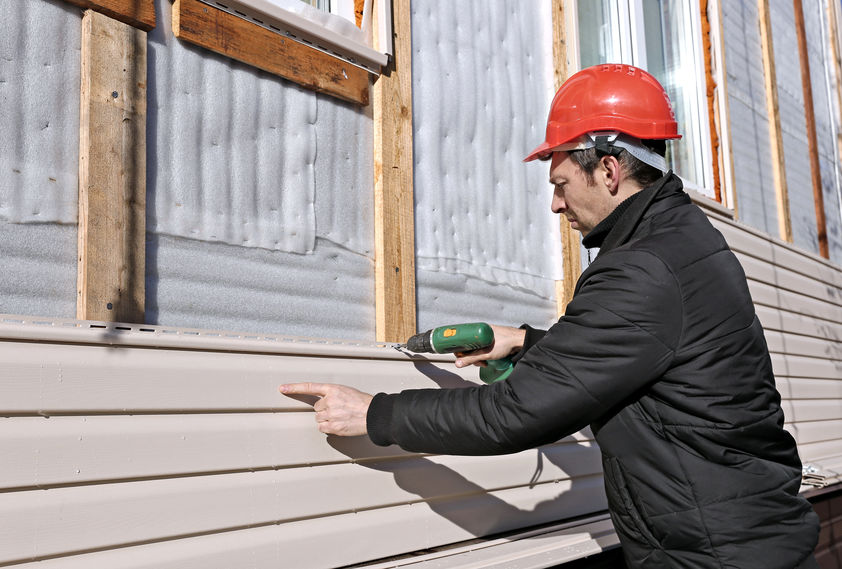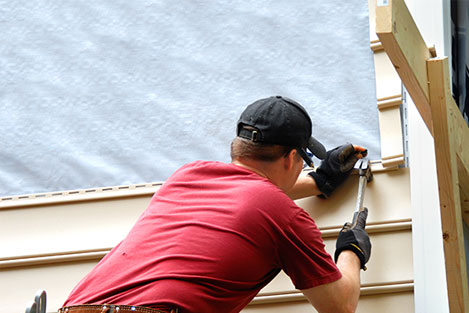Morris Siding Contractor Providing Energy-Efficient Home Exterior Installations
Morris Siding Contractor Providing Energy-Efficient Home Exterior Installations
Blog Article
The Vital Overview to the Various Kinds of Exterior Siding and Their Special Advantages
In the realm of home improvement, choosing the right exterior siding is an essential choice that influences both visual charm and functional efficiency. The range of materials offered, such as timber, vinyl, fiber cement, metal, and brick, each deal unique benefits that satisfy various demands and choices. Understanding these distinctions can significantly boost the longevity and value of a property - morris siding contractor. However, with many choices to take into consideration, which home siding product truly sticks out for your details project? Discovering these choices can cause informed choices that line up with both style and functionality.
Timber Home Siding
Wood exterior siding, a popular selection for household outsides, uses a timeless aesthetic that integrates all-natural beauty with architectural stability. This house siding material is readily available in numerous styles, including clapboard, shingles, and board-and-batten, permitting property owners to personalize their appearance to match their style choices. Timber siding is commonly crafted from resilient varieties such as cedar, redwood, or pine, which are understood for their durability and ability to hold up against ecological stress factors.
One of the key advantages of wood home siding is its superb insulation buildings, which can contribute to energy effectiveness and reduced home heating costs. In addition, wood siding is biodegradable, making it an environmentally pleasant choice when sourced sustainably. Routine maintenance, consisting of paint or staining, can prolong its life-span and enhance its appearance, enabling homeowners to maintain the all-natural beauty of the timber.
Nevertheless, potential downsides consist of susceptibility to parasites, rot, and weather damage, necessitating adequate therapy and upkeep - morris siding contractor. Regardless of these problems, when correctly cared for, timber exterior siding can offer a resilient and attractive service that boosts the personality of a home while offering a cozy, welcoming ambience

Vinyl House Siding
Vinyl home siding has actually arised as a leading choice for home owners looking for a low-maintenance outside alternative that integrates resilience and affordability. This versatile material is crafted from polyvinyl chloride (PVC), making it immune to various climate condition, consisting of wetness and UV rays. Therefore, vinyl house siding does not warp, rot, or discolor, guaranteeing lasting visual charm.
Among the key advantages of vinyl home siding is its considerable series of shades and styles, permitting property owners to achieve the wanted look for their residential or commercial property without the demand for frequent repainting. In addition, plastic siding is easy to install, which can substantially minimize labor costs during building or renovation tasks.
Vinyl siding additionally adds to power efficiency. Numerous choices feature insulation backing, which improves thermal efficiency, helping to preserve comfortable interior temperatures and possibly decreasing energy costs. Additionally, its smooth surface area helps with simple cleansing, requiring just routine cleaning with a garden hose pipe to eliminate dust and particles.
Fiber Cement Home Siding
Fiber cement house siding has gained traction among home owners and contractors alike as a result of its exceptional combination of longevity and visual versatility. Made up of a blend of sand, cellulose, and concrete fibers, this house siding choice is crafted to withstand extreme climate condition, consisting of high winds, heavy rain, and temperature level variations, making it a resilient option for household exteriors.
Among the main benefits of fiber cement exterior siding is its resistance to insects, such as termites, and its non-combustible nature, offering improved fire safety. morris siding contractor. Additionally, it is available in a vast range of designs, shades, and textures, allowing property owners to accomplish their wanted aesthetic without sacrificing performance
One more advantage is its reduced upkeep demands; fiber concrete house siding usually needs painting or discoloration every 5-10 years, which is less regular than other products. Its durability adds to a lower overall cost of ownership, as it decreases the demand for frequent fixings or replacements.
Ultimately, fiber cement home siding stands for a superb investment for those looking for a durable, eye-catching, and flexible exterior alternative, incorporating both kind and function to boost the home's aesthetic allure.
Metal Home Siding
The allure of metal house siding exists in its robust durability and modern visual charm, making it a popular option for modern style. Available in materials such as light weight aluminum and steel, metal home siding supplies a series of coatings and colors, permitting house owners to attain a personalized appearance that find more matches their layout vision.

Energy effectiveness is one more considerable benefit, as lots of steel siding products are created with insulation alternatives that help manage indoor temperatures. This can lead to lowered power prices with time. Additionally, steel house siding is frequently recyclable, making it an eco-friendly choice for sustainability-minded homeowners.
The setup procedure for steel exterior siding can be relatively simple, resulting in a quicker turnaround time for construction jobs. In general, steel home siding incorporates performance and style, making it a functional choice for those looking for a visually enticing and long-lasting exterior surface.
Block and Rock Siding
Block and rock siding sticks out as an ageless option that enhances the visual charm of any type of home. Understood for their durability and reduced upkeep, these products offer an outstanding roi while elevating the residential or commercial property's aesthetic allure. Available in various colors, appearances, and patterns, brick and stone can be customized to suit varied building designs, from conventional to modern.
One of the key advantages of block and rock exterior siding is their energy performance. Both materials possess natural insulating buildings that assist regulate interior temperature levels, possibly lowering heating & cooling expenses. Additionally, they use exceptional fire resistance contrasted to other siding alternatives, contributing to enhanced safety.
One more advantage is their longevity. Brick and rock can last for years, often requiring very little upkeep past periodic cleansing. Unlike wood house siding, they are unsusceptible parasites and rot, making sure a durable exterior that withstands the aspects.
Conclusion
In summary, the selection of exterior siding substantially impacts a home's visual appeal, power efficiency, and maintenance needs. Each type of home siding-- whether wood, vinyl, fiber block, steel, or cement and rock-- provides unique benefits customized to different house owner preferences and ecological problems.
One of the primary advantages of wood house great post to read siding is its exceptional insulation buildings, which can add to energy efficiency and reduced heating costs. Additionally, wood siding is biodegradable, making it an environmentally pleasant option when sourced sustainably.One of the key advantages of metal house siding is its resistance to various ecological aspects.Power efficiency is one more considerable benefit, as lots of steel exterior siding items official source are developed with insulation choices that assist control indoor temperature levels. Each type of home siding-- whether timber, plastic, fiber cement, block, or metal and stone-- uses distinct benefits tailored to numerous house owner choices and environmental problems.
Report this page